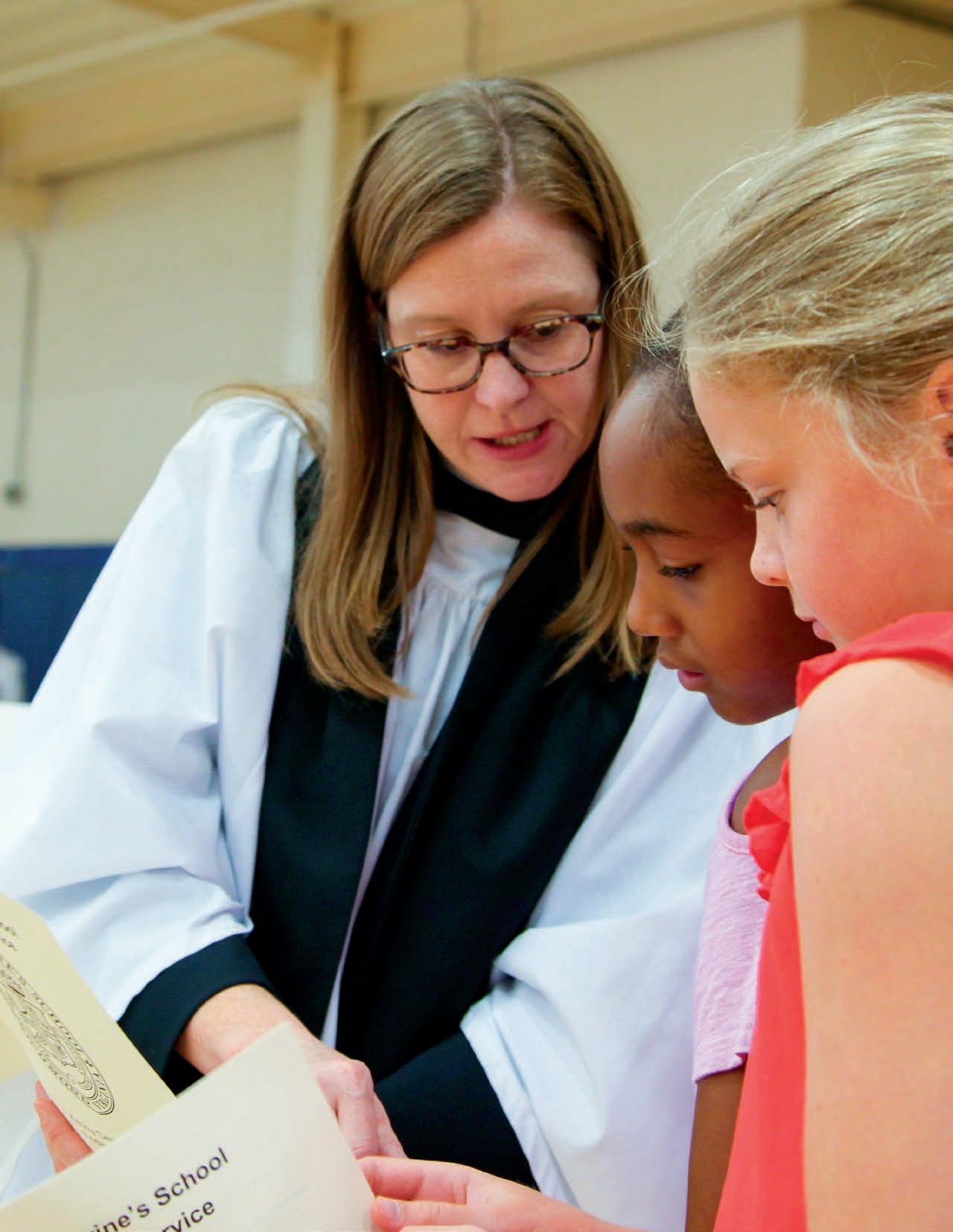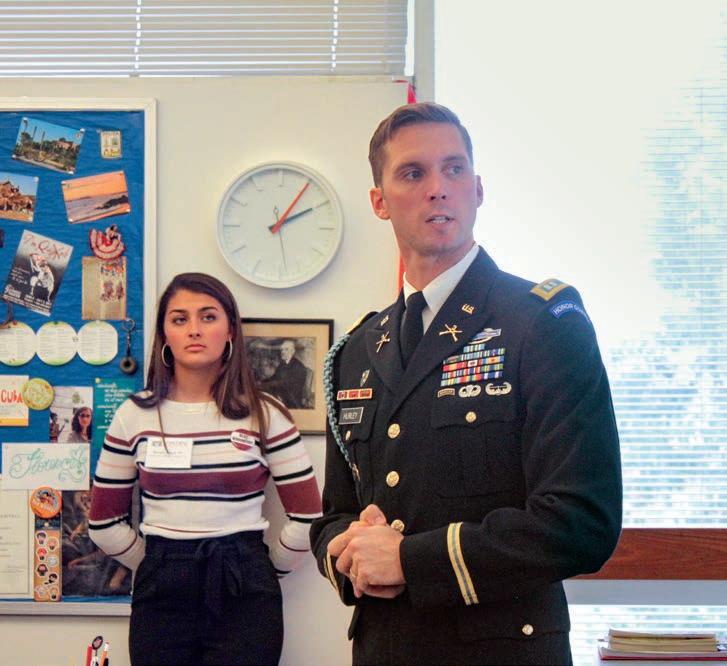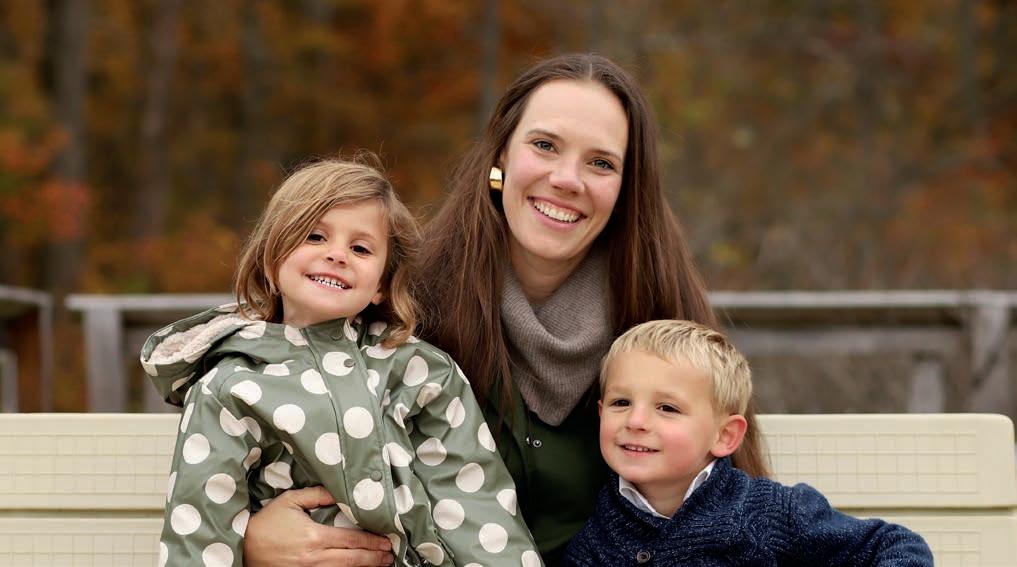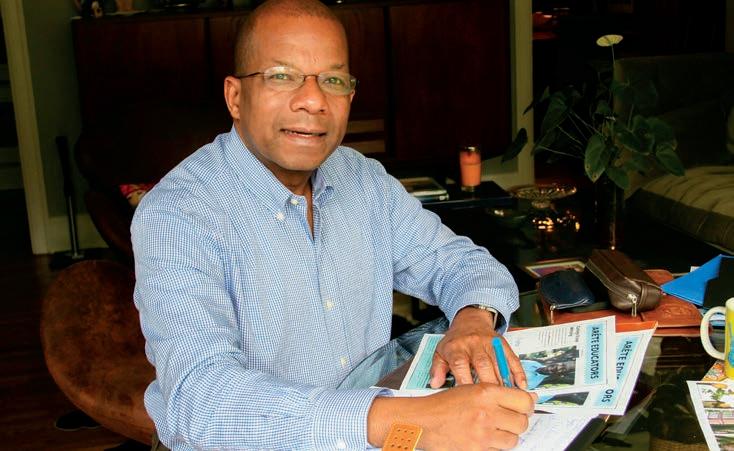
8 minute read
IN SERVICE TO OTHERS
There are no better models for today’s students than our alumni leading lives of service, as they exemplify the values and beliefs behind those words.
We spoke to alumni dedicated to a wide range of causes. Below you’ll find select passages from their interviews. Read them in full at episcopalhighschool.org/EHSServes.
BECKY MCDANIEL ’95, School chaplain at St. Catherine’s School in Richmond
For me, ministry is a service of comfort, healing, and reconciliation. It is about communities seeking God together within whatever context people find themselves, whether in times of joy and celebration or in times of loss and struggle. As a priest, my role is to accompany the communities I serve through varied life experiences prayerfully, calmly, and lovingly. The role of the priest is to be a non-anxious presence in an ever-changing world.
For most of my life I have felt called to comfort people. My struggles with anxiety as a teenager led me to seek ways to help others who shared those struggles. I found that contemplative practices, both within and outside of the Church, held great healing power. Before seminary I taught yoga and meditation, worked as a hospice volunteer, and specialized in therapeutic yoga for children with autism and anxiety. It was during this time that I felt God’s call to a ministry of healing and teaching, and because I had taught middle and high school English, school chaplaincy was a natural fit.
In a world that is increasingly becoming more secular and less religious, it is my hope that I will have guided young people into a life of the spirit, in which they find comfort in things unseen and trust that God is with them.
MATT HURLEY ’08, Retired U.S. Army captain

I chose to serve my country for the same reason that many young men and women seek careers in medicine, law, music, or education: Public service was the family business, and I endeavored to model myself after those who had come before me. I quite simply believed that it was my duty — as an able-bodied, military-aged person graduating from EHS — to serve in uniform during a time of war. During the town hall meeting at EHS before the 2008 presidential election, I listened intently as Sen. John McCain ’54 proclaimed, “I believe that serving a cause greater than your self-interest is obviously the noblest of all causes, and I think the noblest of all those is military service.” That moment reinforced my decision to embark upon my military career, helped me stay the course during some of the crucibles I endured, and continues to influence my decision-making today.
I have questioned many decisions in my life, but I have neither regretted nor revisited that. I will always cherish the very small role I played in molding a more secure and prosperous America. There are endless ways to serve, and I look forward to identifying new areas in the upcoming chapters of my life. I’ve learned that one need not join the military to become an impactful servant-leader.
I hope to be known as a man who pursued the greatest challenges, put his family first, acted with positive intent, owned his mistakes, cared deeply about people, and gave his very best in service to others.
TONI KARASANYI ’00, Communications consultant with the World Bank Group

In my mind, being of service means giving more than you receive. It means striving to enrich the lives of those around you. In development finance, we have a very ambitious mandate to channel billions of dollars to empower developing countries and provide them with the expertise needed to realize their goals. However, on a day-to-day basis, I think “being of service” informs how I treat my colleagues, our partners around the world, and our clients.
I’ve always been motivated to help others more than to focus on myself and my own needs. Before working in this industry, I worked in the private sector in Rwanda and the United States. I find myself much more motivated chasing goals beyond my own sales numbers or other performance metrics. Whether I’m talking with entrepreneurs about how we can better support their start-ups or working with diplomats to better prepare for G20 meetings, I wake up every morning excited.
My grandfather was a reverend, and I was involved in the church from an early age. However, it was at Episcopal where I became more actively involved in volunteering opportunities. In my senior year, I joined the Vestry and helped organize efforts to contribute to local soup kitchens and host groups of underprivileged youth on campus. Whether I was already on the path or not, I think Episcopal certainly helped me realize how much I enjoyed helping others.
It’s important to treat everyone you meet with respect, and to try and help others however and whenever you can. One of my favorite quotes is: “People might not remember what you said, but they’ll remember how you made them feel.” I hope that whoever I meet — at church, at work, or at the dentist’s office — walks away with some positive impression of how I made them feel, even if it’s only for a moment. “Being of service means giving more than you receive. It means striving to enrich the lives of those around you.”
DR. RAVENEL RICHARDSON ’99, Lecturer at Case Western Reserve University who teaches courses on women’s personal narratives and traumas during wartime and genocide

“I want to live in a world where every person lives with dignity, respect, and opportunity.” G rowing up, I watched my parents, grandparents, great grandparents, aunts, and uncles serving their communities in myriad ways, from hands-on work to political representation. My Episcopal faith and the churches I have attended throughout my life have always provided the example of and practical avenues for community service as well.
Being of service means putting others’ needs before my own. I don’t construe that as a sacrifice but rather as a way of being within my family, my city, my country, and the world. I want to live in a world where every person lives with dignity, respect, and opportunity, and my personal and professional service is directed toward that goal. My main focus over the past two years has been raising national awareness about racial disparities in health care, specifically surrounding mental health and substance-use treatment.
I am an empath, and as someone who remains attuned to the suffering of others, I found myself overwhelmed by the state of the world when I was younger. It wasn’t until I turned that focus outward — getting involved in causes important to me — that I began to feel less overwhelmed and more full of purpose. There is always work to be done, whether it’s on a micro level (like your campus) or a macro one (like your country). And as I have grown older I’ve learned the importance of just digging into something that matters to you. Dig in, and get involved in the ways that you can.
For me, choosing to pursue education was choosing a profession of service. I take educating my students about the Holocaust and current genocides seriously. I teach them how the hateful and xenophobic ideologies that underpin these conflicts are on display in our own country today, and I teach them how to get involved rather than to be overwhelmed.
RODNEY RICE ’79, Founder and chief education officer at ARÊTE Educators

I don’t consider what I do as “service” in the traditional way of thinking. I look at service as doing what I love to do — teaching and mentoring others and encouraging them to do whatever brings joy and well-being to all people. We all do service when we do what we love and contribute to the world in pure, positive ways.
When I served as the associate rector for outreach and mission at St. James’ Church in Baltimore, I created St. James’ Academy, an afterschool program to support local children whose families were active members of the church, largely as a result of the efforts of one woman fondly known as “Mama Bert.” Our program was staffed by retired teachers, principals, and social workers who worked collaboratively to focus on academic preparation and career development. Not only did we provide clothing, food, and emotional support, but we also provided mentors, academic coaching, and homework assistance for children in this under-resourced community. I will never forget how this program showed me that tapping into others’ interests and skills not only invites more people to commit to a project but also conveys a strong message that everyone has something to give — something that can make a difference to others.
My whole life has been about taking risks to open doors for others. I was one of the first African American students to graduate from EHS. This experience was difficult yet ultimately the beginning of a longstanding relationship with the Episcopal Church. In 2018, I returned to Episcopal and served on the committee that organized the School’s commemoration of 50 years of integration and also created opportunities to discuss the issues facing students of color presently attending Episcopal. I was thrilled to be able to give back to the school in this way.
I have been the first African American priest and teacher in many of the parishes and schools I have served. I had great success in the late ’80s helping the Diocese of Virginia address its history of racism and inequality. Together, with the rector, vestry, and many parishioners, we set up a structure that allowed people to share their opinions but also included them in developing ways that we could all contribute to becoming a more inclusive community. I hope people will think of me as one who brought healing, acceptance, and laughter to others in a way that elicited the best in everyone and every situation.
“We all do service when we do what we love and contribute to the world in pure, positive ways.”







